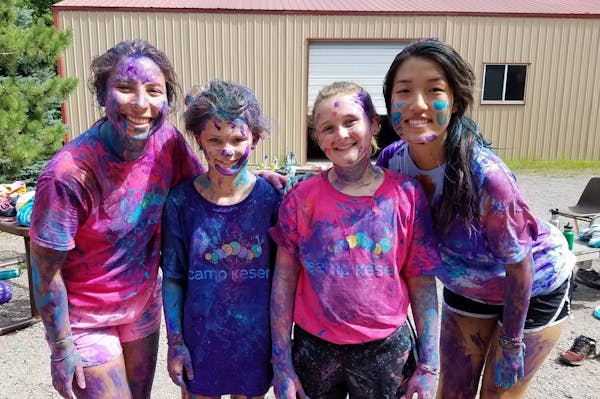They dashed across geometric-pattern carpet from booth to booth, in dress shoes and worn sneakers. Handshakes turned to polite conversations peppered with questions about company structure and advancement opportunities. While the gathering resembled a typical job fair, this one had a twist.
"I'm looking for something permanent," said Rhit Paul, a 48-year-old Marine Corps veteran seeking an alternative to unsteady contract work.
Paul, like many other veterans gathered at the Earle Brown Heritage Center July 18, doesn't just need a job — he needs long-term stability. Luckily, he's in the right place to find it.
Through a robust combination of corporate, government and community efforts over the last decade, state officials have created a comprehensive network to support Minnesota veterans, matching them with jobs, education and other resources. Millions of dollars in state funding, as well as resounding support from Minnesota's highest public offices, has boosted the effort.
This year's annual career fair drew more than 100 booths, representing Minnesota's biggest employers, including Target, 3M and Best Buy. These companies want candidates who are loyal, can lead a team and know how to perform in high-pressure situations, qualities veterans come stocked with, said Jim Finley, director of Veterans Employment Programs at the Department of Employment and Economic Development.
The challenge now, Finley said, is underemployment, or having jobs beneath their skill levels, which affects about one-third of military members nationwide, according to a 2017 study. This support network, which includes 10 Fortune 500 companies, more than 200 Minnesota communities and a variety of government departments, is charged with addressing the challenge, and assuring that veterans find meaningful work that pays at least $15 an hour.
"Ideally, we're trying to get our veterans into positions where they can raise a family, buy a home [and] participate in the whole experience they stood up for," said Finley, who has done this work for 41 years.
But, he added, "It has never been about the money. It has never been about the title. It's about, 'Who am I going to serve, what am I going to be doing?' "
New problem, old issues
The barriers keeping many veterans from ideal jobs tie back to age-old challenges of military to civilian transition, Finley said.
Many vets have resumes loaded with military jargon. Others incorrectly think their skills don't apply to civilian jobs. More don't know options to further their education.
Officials address these issues immediately before and after deployed military return home. At workshops, they critique resumes, teach interview skills and match veterans with job types. Online services also help military members translate their experience into civilian jobs.
Careers in project management, information technology, construction and law enforcement are all popular civilian avenues for this particular workforce.
Sometimes, taking that next step requires education, said Dave Bellefeuille, director of education and employment with the Minnesota Department of Veterans Affairs.
That might mean a degree, certification, license or apprenticeship. To pay for it, veterans traditionally used federal GI bill funds. In 2008, Minnesota started its own fund to complement those benefits.
But Bellefeuille's team has found that many veterans are unaware of state benefits. Annually, the state allocates around $6 million, but veterans only use $3.5 million to $4 million, he said.
"We've done billboards, we've done [radio advertisements], we've done marketing campaigns, we've done everything we can," he said. "But, until you can actually get in front of folks, that's where it finally gets connected."
A statewide connection
Crafting personal ties with veterans has been a decadelong charge for Annette Kuyper, director of military outreach for the Minnesota Department of Military Affairs. Since 2006, 226 cities and towns across Minnesota have joined her department's Beyond the Yellow Ribbon program, each building a comprehensive support network for its veterans.
Related
Start your week Inspired

"It's helped us redirect the goodwill of Minnesotans to where the need truly is in their community," she said.
In 2008, Kuyper's team added corporations to the program, aiming to erase employment barriers from the other side.
Joining the program in December 2017 strengthened Hormel Foods' pre-existing efforts, said Jim Fiala, a hog procurement manager at its headquarters in Austin, Minn. By working with Kuyper's team, Fiala said the efforts of Hormel's veteran resource group, which he co-chairs, became even more intentional. Their 200-person group offers mentor programs, educates hiring managers and provides resources for its approximately 2,000 veteran employees worldwide.
"We value veterans as employees and it's really about putting structure around that," Fiala said.
Kuyper, along with officials like Finley and Bellefeuille, have also established close ties with each other. Between them, they have hundreds of team members across the state at workforce training centers, universities and small communities, all operating on the same message.
"I think that's one of the best things we did in Minnesota and what we received praise from other states for," Kuyper said. "We aligned our messaging."
Purpose and mission
Back at Earle Brown, Dan Krall marched from booth to booth in a dark suit and steel gray tie, handing out resumes from a black suitcase. For him, a job is about more than good pay. It's about purpose.
"I served 23 years in the Air Force and I retired, but I can't imagine myself not working," he said. "I feel like I have a lot to offer and want to be a contributing member to society."
State officials are eager for such contributions.
"We really feel like our service members and veterans have a lot to offer to a workplace, in leadership abilities and their skill sets," Kuyper said. "They can really be the future leaders of Minnesota."
Chris Bowling • 612-673-4434






